Laying out the dos and don'ts for phase two of the pan India lockdown, the guidelines state that all work places should make adequate arrangements for temperature screening and must provide sanitisers at convenient places
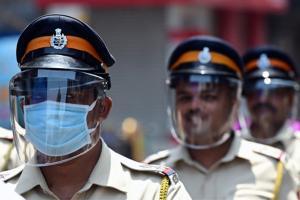
Mumbai police officials snapped during a march past at Metro Junction in South Mumbai. All photos/mid-day photographers
Industrial units in rural areas will be allowed to function from April 20 provided they follow social distancing norms while all kinds of public transport will be barred and public places closed till May 3, according to guidelines issued on Wednesday to enforce the second phase of the lockdown.
Wearing masks/face covers in public places is now compulsory across the country. Besides, spitting in public has been made a punishable offence and a strict ban enforced on the sale of "liquor, 'gutka' tobacco etc" under the new Ministry of Home Affairs guidelines that come a day after Prime Minister Narendra Modi announced the extension of the nationwide lockdown till May 3.
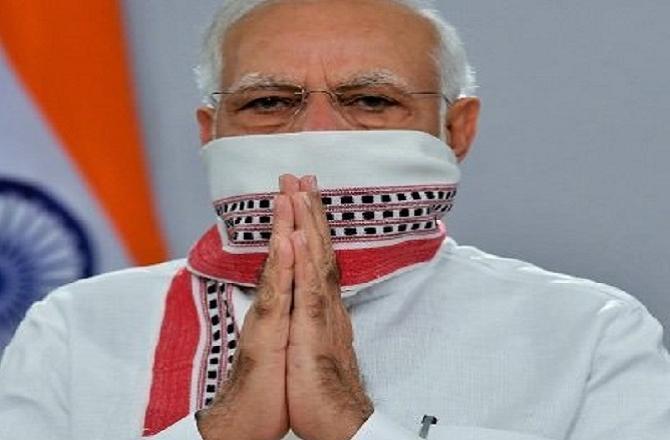 Prime Minister Narendra Modi in his address to the nation on Tuesday, extended the nationwide lockdown till May 3. Pic/Twitter Narendra Modi
Prime Minister Narendra Modi in his address to the nation on Tuesday, extended the nationwide lockdown till May 3. Pic/Twitter Narendra Modi
The prime minister also said necessary activities will be allowed from April 20 in identified areas of the country. A three-week lockdown to contain the spread of COVID-19 came into effect after his announcement on March 24.
Laying out the dos and don’ts for phase two of the pan India lockdown, the guidelines state that all work places should make adequate arrangements for temperature screening and must provide sanitisers at convenient places.
Services provided by self-employed electricians, IT repair personnel, plumbers, motor mechanics and carpenters will be allowed from April 20. While inter-state, inter-district movement of people, metro, bus services will be prohibited till May 3, the government has allowed industrial units located in rural areas to function from April 20 by observing strict social distancing norms.
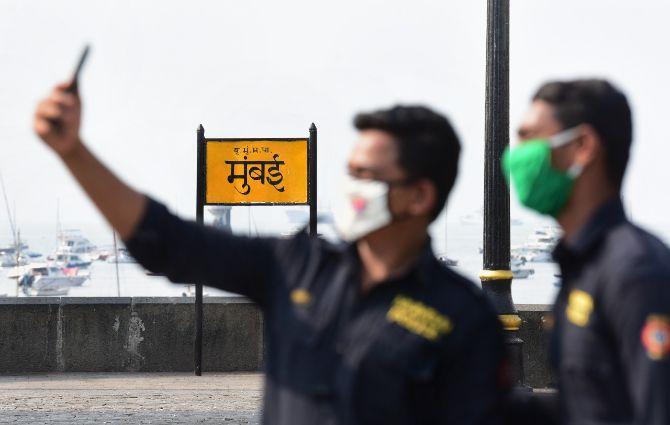 Mumbai police officials snapped during a candid moment at the Gateway of India amid lockdown
Mumbai police officials snapped during a candid moment at the Gateway of India amid lockdown
Manufacturing, industrial units with access control in SEZs, export oriented units, industrial estates, industrial townships will also be allowed to function from that date. Educational institutions, coaching centres, domestic, international air travel, train services will remain suspended, the ministry said.
Public places such as cinema halls, malls, shopping complexes, gymnasiums, sports complexes, swimming pools and bars will be shut too till May 3. All social, political, sports, religious functions, religious places, places of worship will also be closed till then, according to the guidelines.
However, highway ''dhaba'' (eateries), truck repairing shops, call centres for government activities will remain open from April 20. Shops selling agriculture machinery and those dealing with spare parts, supply chains and repairs as well as ''custom hiring centres’ related to farm machinery will also be open from that day.
Activities permitted five days from now include those related to agricultural and the horticultural sectors, farmers and farm workers in the field as well as procurement of agri products. Units manufacturing drugs, pharmaceuticals, medical devices, medical infrastructure, including manufacture of ambulances, will be open from April 20.
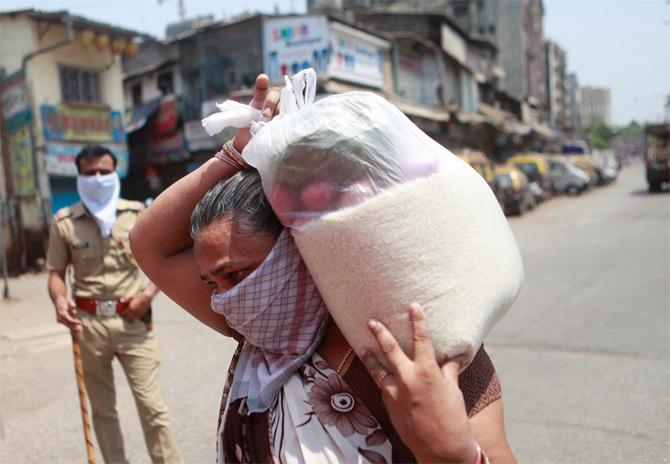
A woman carries ration on her shoulders as a police officer looks on amid lockdown in the city
The guidelines state that grocery stores, fruits, vegetables shops/ carts, milk booths, poultry, meat and fish shop will remain open during the lockdown. However, exemptions given from April 20 will not be applicable in COVID-19 hotspots/containment zones. The document specifies that state/UT governments shall not dilute guidelines in any manner but may impose stricter measures in accordance with local requirements.
The Home Ministry said permitted industries must make arrangements for the stay of workers within their premises or in adjacent buildings by observing social distancing norms. It said Defence, paramilitary, Health and Family Welfare, disaster management, NIC, FCI, NCC, Nehru Yuva Kendra and Customs offices will function without any restrictions.
Other ministries and departments will function with "100 per cent attendance" with deputy secretary and above rank officers. "Remaining officers and staff to attend up to 33 per cent as per requirement," it said. According to the guidelines, in order to mitigate the public’s hardship, select additional activities will be allowed from April 20.
"However, these additional activities will be operationalised by states and UTs and district administrators based on strict compliance to existing guidelines on lockdown measures," it said.
Activities permitted from April 20 are aimed at ensuring that agricultural and related activities remain fully functional, rural economy functions with maximum efficiency, employment opportunities are created for daily wage earners and other members of labour force, select industrial activities are allowed to resume their operations, with safeguards and mandatory standard operating protocols and digital economy, states the document.
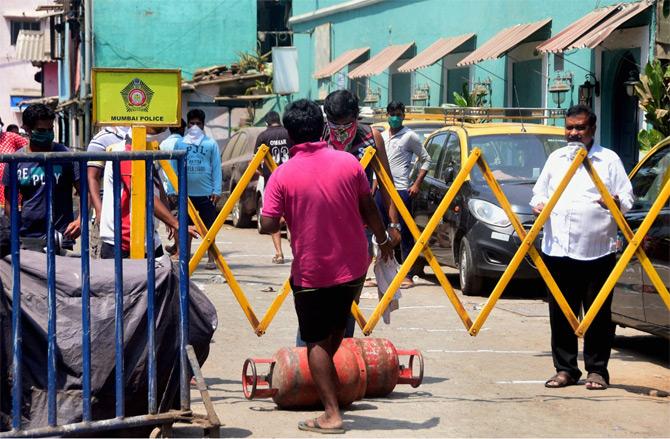 Police authorities seal off Worli-Koliwada after coronavirus positive cases were confirmed from Worli
Police authorities seal off Worli-Koliwada after coronavirus positive cases were confirmed from Worli
The revised guidelines will not apply in containment zones, as demarcated by states/ UTs/ district administrations. If any new area is included in the category of a containment zone, the activities allowed in that area till the time of its categorization as a containment zone will be suspended except those specifically permitted under the Health Ministry’s guidelines.
Containment zones will be demarcated by states/UTs/ district administrations in accordance with the ministry’ guidelines. In these zones, no unchecked inward/outward movement of population would be allowed, except for essential services.
The government described digital economy as critical to the services sector. Accordingly, e-commerce operations, operations of IT and IT enabled services, data and call centres for government activities, and online teaching and distance learning are all permitted.
Catch up on all the latest Crime, National, International and Hatke news here. Also download the new mid-day Android and iOS apps to get latest updates.
Mid-Day is now on Telegram. Click here to join our channel (@middayinfomedialtd) and stay updated with the latest news
This story has been sourced from a third party syndicated feed, agencies. Mid-day accepts no responsibility or liability for its dependability, trustworthiness, reliability and data of the text. Mid-day management/mid-day.com reserves the sole right to alter, delete or remove (without notice) the content in its absolute discretion for any reason whatsoever
 Subscribe today by clicking the link and stay updated with the latest news!" Click here!
Subscribe today by clicking the link and stay updated with the latest news!" Click here!









